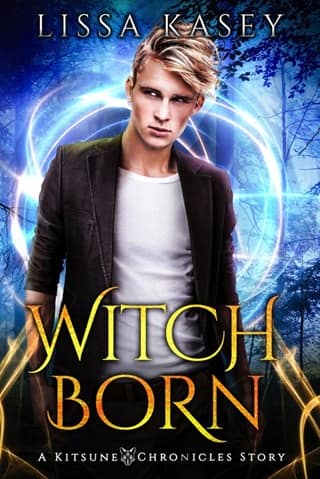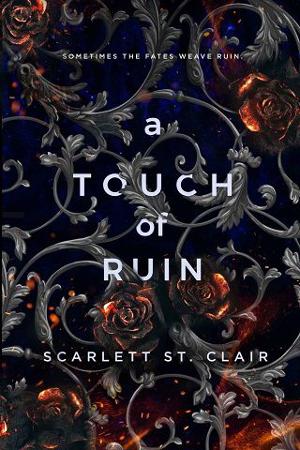Chapter 36
Thirty-Six
FINN
I paced for a while, gearing up to touch my father, and freaking myself out at the same time. The vision of him, a strange mess of darkness, not unlike the curse the wolf and I bore. Was that part of being the Autumn king? Did it mean there was no way to break free of Winter’s curse? Or perhaps it wasn’t related to Winter at all.
The whole fae thing made me miss my college friend, Cassidy, who had a strange obsession for serial killer documentaries and missing persons cases. She could pick details out of things and tie it together in dizzying ways.
I stared up at the man/beast thing, heart pounding, but beyond the garden of statues, and the walkway of berries, no one came or went, not even the wolf. Why had it cast me into this place? To torture me with memories? Why keep these memories? Were they the key to our broken state?
“I could use your sarcasm,” I said out loud as though Wesley could somehow hear me. “Or insight.” I took a long breath. “I hope you’re okay. The Summer king better take good care of you.”
The Summer king’s statue remained unchanged in the distance, quiet and serene, though I knew the memory of it had been a dark terror of drowning in shadows. I took a step toward my father’s statue and clenched my fists.
“You can do this. Whatever you see, it’s already over,” I reminded myself. “Like a bad movie or a scene in a book that rips out your heart but you know will have a good ending.” I hesitated, and realized that I didn’t know that. “I will have a good ending,” I said. “My life and my actions are my choice. I carve my own path.” Wesley cursed the fates as though they were real people. Did that mean I didn’t really have a choice? They made us mates, if that were the case.
“Okay,” I acknowledged. “Some things are set, right? I can work with that.” I reached up to set my palm on my father’s arm. “Let’s do this.”
The world shifted to a small market, and I must have been older as I sold my mother’s tinctures and pouches of herbs at a table while she wandered through the other booths. No one haggled with me, as they were all grateful to receive the goddess’s blessing for everything from fertility to health through the coming winter.
Our route had changed over the years, my mind suddenly recalling a dozen towns and a several week trek changing into only a handful, making winters harsher with the lessened availability of supplies. Why?
I couldn’t yet grasp that memory as a young woman approached the table with her hands clutched to her chest. “Do you have something to help me hold a child? Auntie says the goddess is best to ask. The priest says only prayer can help, but that hasn’t worked.”
A new wave of a strange religion had popped up across the area. Mother and I had no interest in it, and avoided it when possible, their control over the small towns and their people, frightening.
“Yes,” I said, and gathered a basket of supplies. “It’s a simple tea,” I gave her the instructions and filled a small cloth bag.
The woman continued to glance behind her, watching the market with worry as she handed over a few coins. “Thank you,” she said as she darted away like she was afraid to be seen at our stand. The traffic had been unusually quiet, though the market area thrived with folks haggling for eggs and other delights like the sweet jams my mother often traded her teas and soaps to keep me in the delicacy all winter.
Mother approached; her expression guarded.
“Everything okay?” I asked.
“I’m going to pack a basket for you to bring to your apa,” she answered instead of acknowledging my question.
“Alright. But don’t you need help with the market?”
She gave me a careful smile and leaned in to kiss me on the cheek. “I’ll meet you at home.”
“I could trade labor for a few more supplies,” I offered. “I’m strong.”
“You are, baby. But no, bring this to apa and head home. Lena will meet you halfway.”
“That means you’ll have to pull the cart yourself.”
“Do you think your mama isn’t strong?”
I snorted, knowing better than most how strong she was.
A group of men wandered through the crowd, their gazes examining each booth. I couldn’t recall ever seeing men as heavily armed in the market before. Mother stiffened. They paused at the edge of our display.
“What is this?” The first male demanded.
“Soaps, teas, and scents,” Mother said, her gaze focused on me. Many of the soaps and teas had specific uses like fertility, pain relief, or even to calm the mind.
“Why is your boy not serving the church?”
“We are from far away,” Mother said. “Trading for supplies for the winter.”
“Where is your husband?” The man said.
“He’s working. My boy is about to take supplies to him.”
It was the oddest conversation I could ever recall her having with anyone. They dug through the basket for apa, which was dried meats, mushrooms, and a handful of root vegetables, a variable feast for most. Mother added two jars of preserves to the basket, ignoring the men as they examined everything. She never gave apa preserves.
“You should go before it gets too late,” Mother said to me. “You know how chilly the nights are getting.”
My heart raced as I gathered up my pack, not wanting to leave with a sense of dread building in my gut. But mother took my place in our booth and shooed me away, her gaze at the men pleasantly bland. I headed away from the market feeling their eyes on me and wondering if I should hide the route to apa’s. It would take me longer, meaning I’d arrive well after dark, but I didn’t want them to follow.
Tension finally left my shoulders once night fell and I was several hours walk from the small town and their strange market. I’d convince mother to avoid that one next time. The religious obsession spreading across the land in an odd shift of control. Some markets completely closed or run by religious officials who demanded control of supplies. I recalled an argument mother had with a particular pair of them who demanded her entire stock as a donation. Months’ worth of gathering supplies and creating items for trade, which would have left us starving during the winter. We had left that town and never returned. What would happen if they all followed suit? Would we have anywhere left to go?
Apa’s cave, nested in shadows, sat untouched and quiet as usual. I stalked to the stump, set down the basket, and waited, no longer afraid of the surly beast.
A set of eerie eyes glowed from the opening of the cave, hesitant.
“Come on then,” I said, setting out the display of treats I’d brought, but pausing over the jams. Had mother meant them for apa? I couldn’t recall him ever eating them. I tossed a large hunk of dried meat his way.
After a few long moments of wariness, he crawled from the cave on all fours, more beast than man, and devoured the meat. I threw a few more and after a time he sat at my feet like an affectionate dog rather than a bear infected with darkness, his breath labored. Mother said the blight would eventually take him from this world and it was a kindness to give him aid until the earth took him back.
Any glimpse of the man he’d been had vanished several years prior as if the soul beneath had been suffocated by the writhing darkness. I petted his head, fur matted and coarse, but the shadows couldn’t cling to me.
“Mother doesn’t know of a way to remove the blight. She’s not sure how it started,” I said as I opened a jar of preserves and offered him a taste. He snuffled it, then licked my hand, something I’d have not braved when I was younger. “She misses you.” Mother spoke of apa often, reciting memories of their youth, and the wild love that brought them together. The blight had appeared after one particularly harsh winter when mother arrived at his cave to present me, his newborn son. The madness took several years to really dig into him, and even less time to eat away at what remained of the man beneath the bear’s fur.
Lost in the dark, perhaps? I didn’t understand and he couldn’t tell me.
“I would have liked to know you,” I said and got up. “I should go.” The stretch of moonlight overhead would guide my path. “Mother is waiting.”
 Fullepub
Fullepub 



